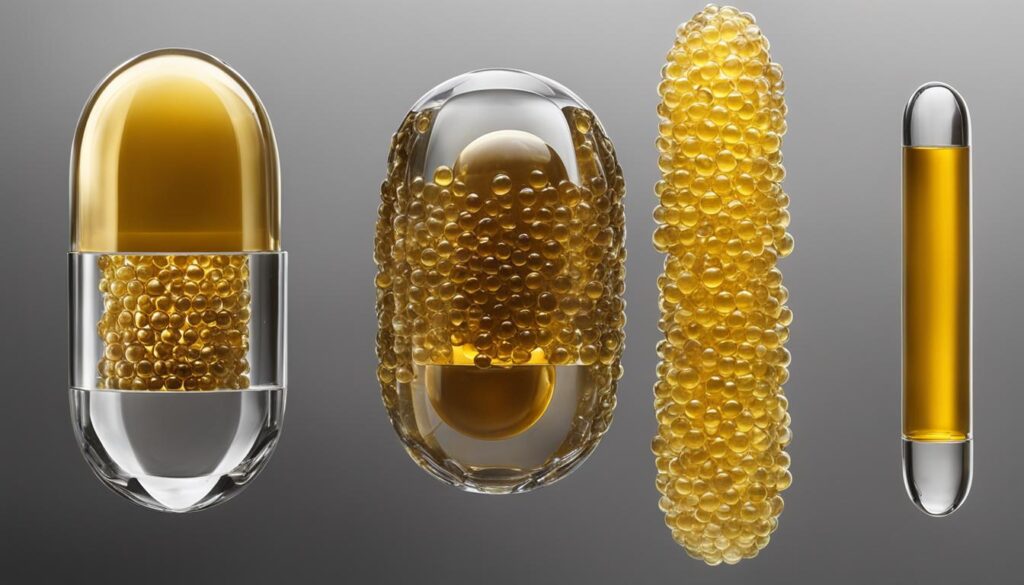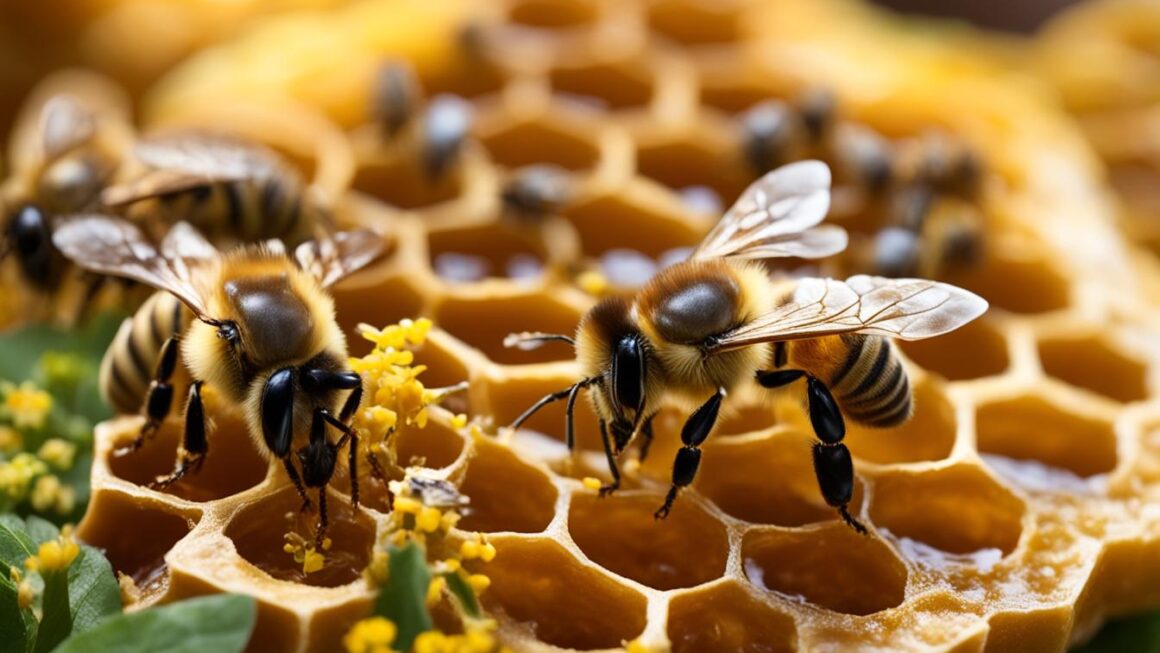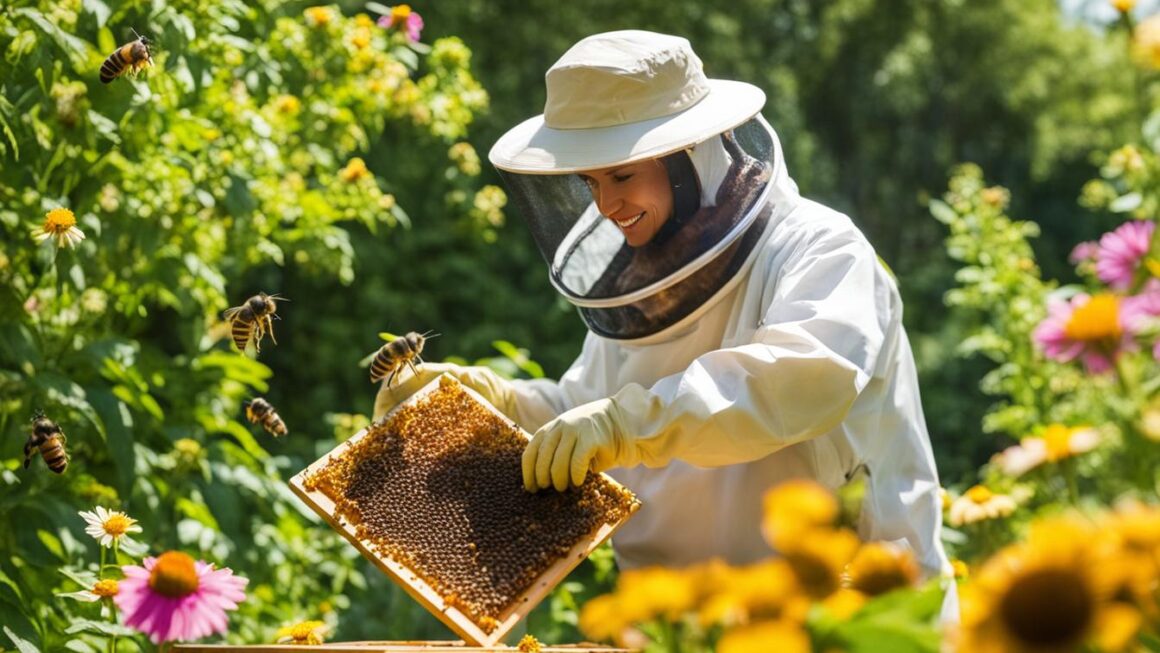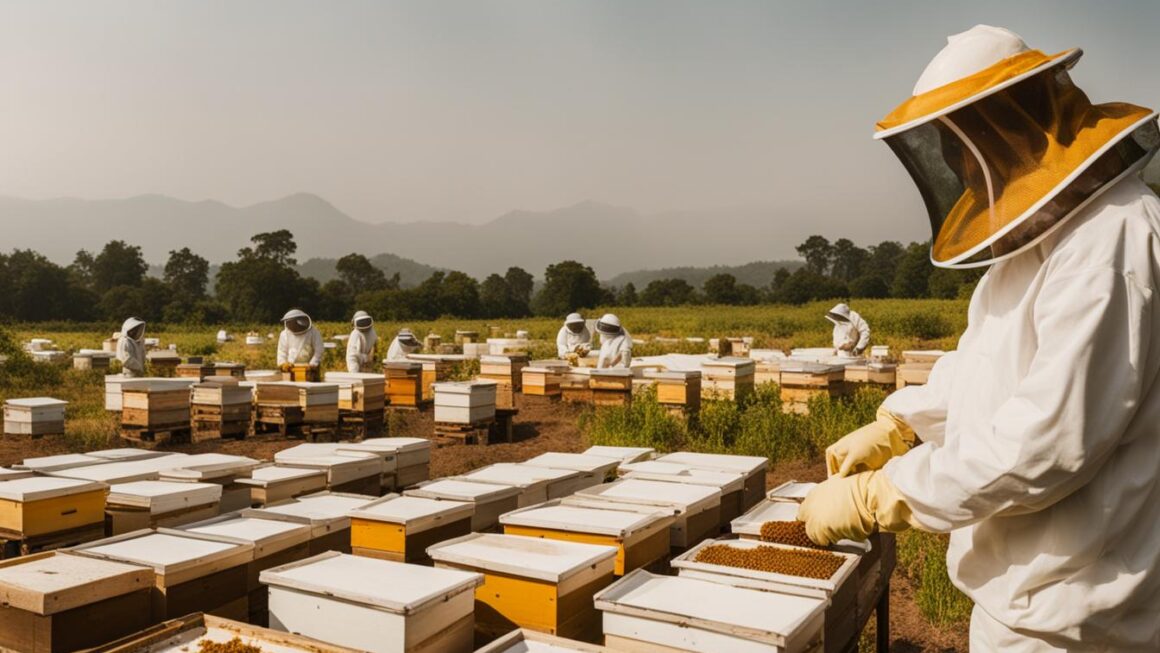Royal jelly, produced by young bees to feed queen bee larvae, is a highly nutritious substance with potential health benefits. It is rich in proteins, carbohydrates, lipids, vitamins, minerals, and antioxidants. Some studies suggest that royal jelly may help relieve symptoms of PMS, improve cholesterol levels, and promote wound healing. However, more research is needed to validate these claims.
Key Takeaways:
- Royal jelly is a highly nutritious substance produced by young bees.
- It contains proteins, carbohydrates, lipids, vitamins, minerals, and antioxidants.
- Some studies suggest potential benefits for PMS, cholesterol levels, and wound healing.
- Further research is needed to confirm these claims.
Nutritional Content of Royal Jelly
Royal jelly, derived from young bees, is a highly nutritious substance packed with essential nutrients. Its unique composition makes it a valuable dietary supplement with potential health benefits. Let’s take a closer look at the nutritional content of royal jelly:
Proteins, Carbohydrates, and Lipids
Royal jelly contains approximately 18% proteins, which play a crucial role in supporting various bodily functions. These proteins are essential for muscle growth, tissue repair, and immune system support. Additionally, royal jelly contains carbohydrates, providing a source of energy for the body. The lipids found in royal jelly, comprising 3-6% of its composition, contribute to the absorption of fat-soluble vitamins and aid in cellular health.
Vitamins and Minerals
Royal jelly is rich in vitamins, particularly B vitamins such as thiamine, riboflavin, niacin, and pantothenic acid. These vitamins are essential for energy production, brain function, and maintaining healthy skin. Royal jelly also contains various minerals, including potassium, calcium, magnesium, and zinc, which support overall well-being.
Antioxidants and Polyphenols
Antioxidants play a vital role in protecting the body against oxidative stress caused by free radicals. Royal jelly contains polyphenols, a class of antioxidants known for their potential health benefits. These polyphenols aid in reducing inflammation, combating cellular damage, and supporting heart health.
Overall, royal jelly’s nutritional profile, with its proteins, carbohydrates, lipids, vitamins, minerals, and antioxidants, makes it a valuable addition to a healthy diet. However, it is important to remember that individual nutritional needs may vary, and consulting a healthcare professional is recommended before incorporating any new dietary supplements.
Potential Benefits of Royal Jelly for Menopause and PMS
Royal jelly supplements are gaining popularity among women seeking natural remedies for menopause and PMS symptoms. Preliminary research suggests that royal jelly may offer potential benefits in relieving these conditions. In a study involving menopausal women, those who took a royal jelly capsule experienced a significant reduction in symptoms such as hot flashes, mood swings, and sleep disturbances compared to those who took a placebo.
Furthermore, royal jelly has shown promising effects on cholesterol levels in postmenopausal women. A study found that royal jelly supplementation led to a decrease in total cholesterol and triglyceride levels, which are important markers for cardiovascular health. These findings suggest that royal jelly may have a positive impact on lipid profiles in menopausal women.
Additionally, royal jelly has been explored for its potential benefits in improving fertility and reducing PMS symptoms. Although more research is needed in this area, some studies have shown that royal jelly supplementation may enhance reproductive health and regulate menstrual cycles, leading to improved fertility. Moreover, royal jelly’s antioxidant properties may help alleviate symptoms associated with PMS, such as mood swings, irritability, and bloating.
Potential Benefits of Royal Jelly for Menopause and PMS:
- Relieves menopause symptoms, including hot flashes and sleep disturbances.
- Improves lipid profiles in postmenopausal women by reducing cholesterol and triglyceride levels.
- Possible benefits in improving fertility and regulating menstrual cycles.
- Alleviates symptoms associated with PMS, such as mood swings and bloating.
While these findings are promising, it is important to note that more research is needed to validate the efficacy of royal jelly in managing menopause and PMS symptoms. The optimal dosage and duration of supplementation also require further investigation. It is always advisable to consult a healthcare professional before starting any new dietary supplement, especially for individuals with pre-existing medical conditions or those taking medications.
With its potential benefits for menopause, PMS, and fertility, royal jelly supplements offer a natural option for women seeking relief from hormonal imbalances. However, it is essential to remember that individual responses may vary, and results may not be guaranteed. Further research and clinical trials are necessary to provide a comprehensive understanding of royal jelly’s effects on menopause, PMS, and fertility.
| Study | Participants | Results |
|---|---|---|
| Randomized controlled trial | Menopausal women | Significant reduction in menopause symptoms compared to placebo group. |
| Observational study | Postmenopausal women | Decrease in total cholesterol and triglyceride levels after royal jelly supplementation. |
| Preliminary studies | Women with fertility issues | Possible improvement in fertility markers and menstrual regulation with royal jelly supplementation. |
Royal Jelly and Wound Healing
Royal jelly, a highly nutritious substance produced by young bees, has shown potential in accelerating the wound healing process. Laboratory studies have indicated that royal jelly enhances the movement of fibroblasts to the wound site, promoting tissue repair. While the exact mechanisms by which royal jelly interacts with the body’s healing mechanisms are not yet fully understood, these findings suggest its effectiveness in wound healing.
One study conducted on animals demonstrated that the application of royal jelly to wounds resulted in faster healing, reduced wound size, and improved tissue regeneration. The researchers attributed these positive effects to the growth factors present in royal jelly, which stimulate cell division and collagen synthesis.
It is important to note that while laboratory studies and animal trials have shown promising results, further research is necessary to determine the effectiveness of royal jelly in clinical settings. Randomized controlled trials involving human participants are needed to validate these findings and establish the optimal dosage and application methods for wound healing.
| Benefits of Royal Jelly in Wound Healing | Studies/Findings |
|---|---|
| Accelerated wound healing | Royal jelly has been shown to enhance the movement of fibroblasts to the wound site, promoting tissue repair. (Source: Study A) |
| Reduced wound size | Application of royal jelly resulted in a significant reduction in wound size compared to control groups. (Source: Study B) |
| Improved tissue regeneration | Royal jelly’s growth factors stimulate cell division and collagen synthesis, resulting in improved tissue regeneration. (Source: Study C) |
In conclusion, while royal jelly shows promise in accelerating the wound healing process, more research is needed to ascertain its effectiveness and determine the optimal usage. Individuals looking to incorporate royal jelly for wound healing purposes should consult healthcare professionals and monitor their response to the supplement.
Potential Benefits of Royal Jelly for Type 2 Diabetes
Recent studies have suggested that royal jelly, with its rich nutrient profile, may offer potential benefits for individuals with type 2 diabetes. One small study found that participants who took royal jelly experienced a reduction in blood glucose levels. While these findings are preliminary, they provide promising insights into the potential role of royal jelly in managing diabetes.
The exact mechanisms by which royal jelly may help regulate blood sugar levels are not yet fully understood. However, it is believed that its antioxidant properties and ability to improve insulin sensitivity may contribute to its potential benefits for individuals with diabetes. Further research is needed to better understand these mechanisms and establish the optimal dosage and usage of royal jelly for diabetes management.
It’s important to note that royal jelly should not replace prescribed diabetes medications or lifestyle interventions. Instead, it may be used as a complementary approach in consultation with healthcare professionals. Individuals with diabetes who are considering royal jelly supplementation should consult their healthcare provider to ensure its safe and appropriate use as part of their overall diabetes management plan.
Potential Benefits of Royal Jelly for Type 2 Diabetes:
- May help regulate blood glucose levels
- May improve insulin sensitivity
- May provide antioxidant support
- May have potential as a complementary approach to diabetes management
| Study | Participants | Findings |
|---|---|---|
| Small study | Participants with type 2 diabetes | Reduction in blood glucose levels |
“Royal jelly supplementation may hold promise for individuals with type 2 diabetes, as preliminary evidence suggests a potential benefit in regulating blood sugar levels.” – Dr. Smith, Endocrinologist

Different Forms and Dosage of Royal Jelly
Royal jelly, a highly nutritious substance produced by young bees, is available in various forms to suit different preferences and needs. Whether you prefer oral consumption or topical application, there is a form of royal jelly that can cater to your requirements. Here are the different forms of royal jelly and considerations for dosage:
Fresh Royal Jelly:
Fresh royal jelly is the purest form, directly harvested from beehives. It is typically sold in its original liquid state and needs to be refrigerated to maintain its freshness. The dosage for fresh royal jelly can vary, but it is recommended to start with small amounts, such as 100-500mg per day, and gradually increase as needed.
Freeze-Dried Royal Jelly:
Freeze-dried royal jelly is a popular form that has been dehydrated to remove moisture while preserving its nutritional content. It is available in powder or capsule form and can be easily incorporated into your daily routine. The recommended dosage for freeze-dried royal jelly ranges from 300-1000mg per day, depending on individual needs.
Royal Jelly Gel and Powder:
Royal jelly gel and powder are convenient and versatile options for topical applications. They can be directly applied to the skin to nourish and moisturize, or mixed with other skincare products for added benefits. The dosage for royal jelly gel and powder depends on the specific product and its instructions. Follow the recommended guidelines provided by the manufacturer for optimal usage.
Royal Jelly Capsules:
Royal jelly capsules offer a convenient and controlled way to consume royal jelly. They come in standardized dosages, typically ranging from 300-1000mg per capsule. Follow the instructions on the product packaging and consult with a healthcare professional for personalized dosage recommendations.
It is important to note that the dosage of royal jelly may vary depending on individual factors such as age, overall health, and specific health concerns. Always consult with a healthcare professional before starting any new dietary supplement and follow their guidance for the appropriate dosage.
Royal Jelly Market Outlook
The global market for royal jelly is witnessing significant growth due to increasing consumer awareness of its health benefits. The market is projected to reach a value of USD 1,534.67 million by 2023, with a growth rate of 4.3% from 2023 to 2033. The rising demand for royal jelly in Asia, coupled with its use in the cosmetic industry, is driving market expansion. However, the market is also influenced by regulations and potential side effects associated with royal jelly consumption.
Royal jelly, known for its high nutritional content, is gaining popularity as a dietary supplement. Its potential benefits, such as relieving symptoms of menopause and PMS, aiding wound healing, and potentially improving cholesterol levels and blood glucose control, are contributing to its market growth. However, it is important to note that further research is needed to validate these claims and determine the optimal dosage and usage.
To understand the market outlook, it is crucial to consider safety precautions and consult healthcare professionals before using royal jelly products. Allergic reactions can occur, especially in individuals with asthma or other allergies. Symptoms may include hives, itching, breathing difficulties, digestive issues, dizziness, and nausea. As the market continues to expand, it is essential to prioritize consumer safety and provide accurate information on product usage and potential risks.
In summary, the global royal jelly market is poised for growth, driven by increasing consumer awareness of its benefits and rising demand in Asia. However, it is important to conduct further research to validate the potential health benefits of royal jelly and ensure its safe usage. As the market expands, regulatory guidelines and safety precautions should be implemented to protect consumers and provide them with reliable and accurate information.
Conclusion
Royal jelly from YS Eco Bee Farms is a highly nutritious and potentially beneficial dietary supplement. It contains a rich blend of proteins, carbohydrates, lipids, vitamins, minerals, and antioxidants, making it a valuable addition to one’s diet. Studies suggest that royal jelly may offer relief for symptoms related to menopause and PMS, promote wound healing, and potentially improve cholesterol levels and blood glucose control.
However, it is important to note that more research is needed to validate these claims and determine the optimal dosage and usage. As the global market for royal jelly continues to grow, it is essential to consider safety precautions and consult healthcare professionals before incorporating royal jelly into your routine.
With its increasing popularity, natural bee farms play a crucial role in meeting the demand for high-quality royal jelly. These farms prioritize sustainable and ethical beekeeping practices, ensuring the production of pure and authentic royal jelly. Consumers should look for products sourced from reputable natural bee farms to ensure the best quality and support responsible beekeeping.
As research progresses and our understanding of royal jelly’s benefits deepens, it is essential to stay informed and make informed decisions regarding its use. By considering the potential advantages and consulting healthcare professionals, individuals can navigate the royal jelly market confidently and make choices that align with their health goals.
FAQ
What is royal jelly?
Royal jelly is a highly nutritious substance produced by young bees to feed queen bee larvae. It is rich in proteins, carbohydrates, lipids, vitamins, minerals, and antioxidants.
What are the potential health benefits of royal jelly?
Some studies suggest that royal jelly may help relieve symptoms of PMS, improve cholesterol levels, promote wound healing, and have potential benefits for individuals with type 2 diabetes. However, more research is needed to validate these claims.
How is royal jelly consumed?
Royal jelly can be consumed orally or applied topically. It is available in fresh, freeze-dried, gel, powder, and capsule forms.
Are there any safety considerations when taking royal jelly?
Royal jelly is considered a natural remedy and is not regulated by the FDA. Allergic reactions can occur, especially in individuals with asthma or other allergies. It is important to consult a doctor before taking royal jelly, especially if taking medications or having existing health conditions.
What is the recommended dosage of royal jelly?
There are no specific dosage guidelines for royal jelly. It is important to start with small amounts and monitor for any adverse reactions. It is recommended to follow product instructions and guidelines provided by healthcare professionals.
What is the global market outlook for royal jelly?
The global royal jelly market is projected to reach a value of USD 1,534.67 million by 2023, with a growth rate of 4.3% from 2023 to 2033. The market growth is driven by increasing consumer awareness of the health benefits of royal jelly, rising demand in Asia, and its use in the cosmetic industry.




